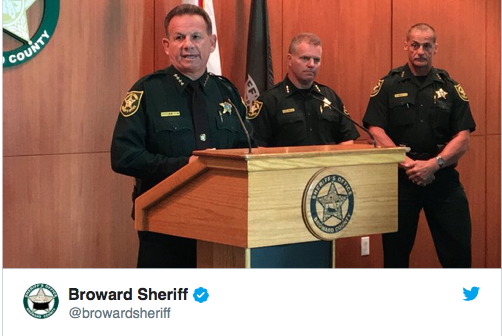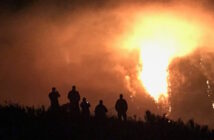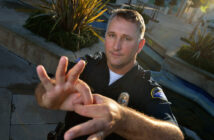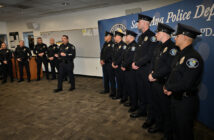The issue of officer-involved shootings has been part of the national discourse for some time. With the tragedy in Parkland, FL another issue has risen to the forefront: The cop who didn’t shoot quickly enough.
According to Broward County Sheriff Scott Israel, the deputy assigned as the school resource officer for Douglas High School responded to the building where the shooting was taking place almost immediately. After taking a position outside, he never entered the building.
During a news conference, Israel said, “I am devastated, sick to my stomach. He never went in.”
When asked what his expectation is, Israel said: “Went in, addressed the killer, killed the killer.”
There have been questions about the on-site school resource officer and what his status was at the time of the shooting. Those now-answered questions have added to the controversy of this already tragic event.
President Donald Trump has even chimed in. On Friday, he criticized the officer’s response, saying, “He’s trained his whole life, but when it came time to get in there and do something, he didn’t have the courage, or something happened. But he certainly did a poor job — there’s no question about that.”
The officer’s lack of response is a black eye for law enforcement officers everywhere. The deputy has chosen to resign after being placed on leave.
Ever since Columbine, police officers across the country have been trained to engage active shooters on school campuses. Seconds, not minutes, are critical. In every training since then, you are made aware of the fact there is a high likelihood you will get shot.
This training, however, usually involves teams of officers responding in formation. Training to respond as a solo responder to an active shooter is not something that is usually covered.
It’s not ideal to go up against a gunman with an assault rifle while the officer is armed with only a sidearm, but good tactics and dealing with an inexperienced shooter does give the officer an advantage. Engaging the shooter also creates a distraction and makes the shooter take their focus off the victims.
Fellow officers on many law enforcement social media pages have been highly critical as well. In one of the more tame comments, one officer wrote in a Facebook post on Police One, “There are times when you have to take a deep breath, say ‘it sucks to be me’, lower your head, and dive in…I feel for this officer, but this is one of those times where it becomes bigger than you.”
The officer in this case was not a rookie. According to media reports, he is a 30-year-plus decorated veteran.
So, what went wrong?
The officer could have made a significant error in assessing the situation and planning his response. Could his training have included waiting for follow-up? Could he have just frozen with indecisiveness? Could he have been waiting to take out the shooter when he exited the building (this is not a good strategy when you can hear people being shot)?
Or worst of all, did he allow his fear to overcome his duty to respond? I’ve known hundreds, if not thousands, of officers who will all say they would have gone in. But would they really?
The officer’s failure in judgement or character in this case was costly, and he will have to live with that the rest of his life. He will have to look in the mirror every day and wonder what went so wrong. In an online conversation, retired Anaheim Officer Cliff Morris quoted from Master and Commander: “The simple truth is, not all of us become the men we once hoped we might be. We are all God’s creatures…” Sometimes we all fall short of expectations.
In this case, the price is high for the officer and he may be the final scapegoat in a long line of misjudgments and errors.
Joe is a retired captain. He can be reached at jvargas@behindthebadgeoc.com.
 Behind the Badge
Behind the Badge



